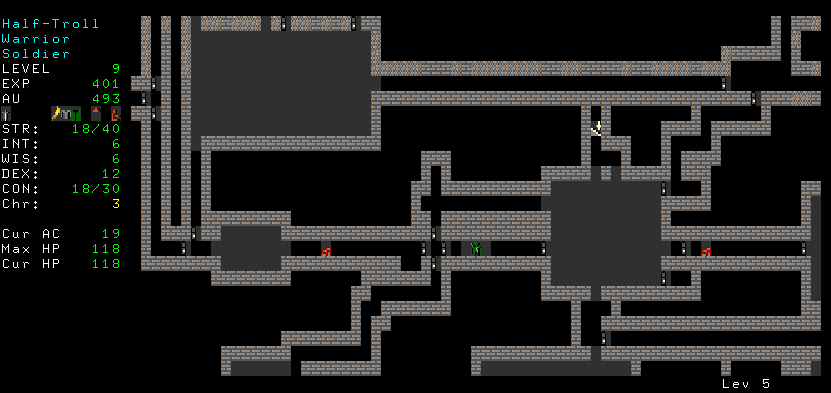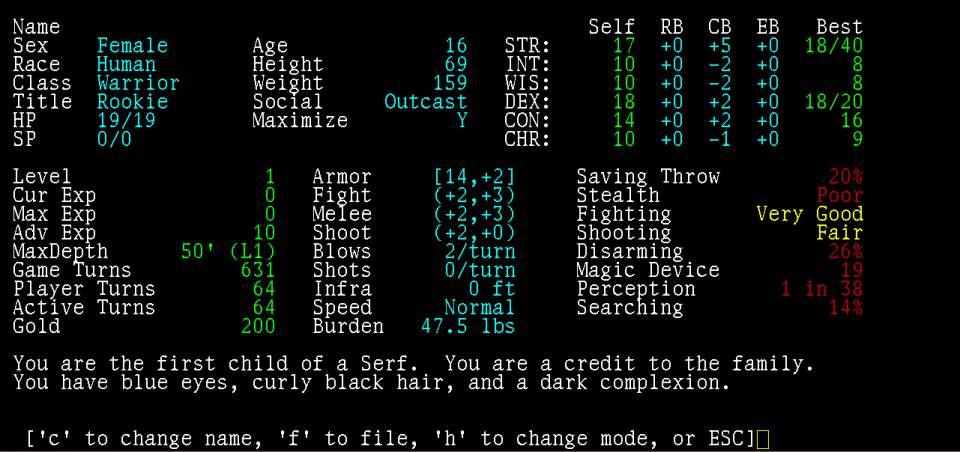Overview
Angband is an open source dungeon-crawler, based on Umoria, a Unix port of the roguelike game Moria. It's based most heavily around the mythos created by J. R. R. Tolkien within his books The Hobbit and The Lord Of The Rings. Within these books, Angband is the fortress of Morgoth, the ultimate target of your descent into the dungeons that await you.
First released in 1990, Angband has passed through the hands of many volunteer maintainers over the decades and is still in active development.
Gameplay
 Dungeon Delving
Dungeon DelvingYou start your adventure in a town containing your home and stores, and a stairway into the dungeons below. Your task is to delve through one hundred levels of the dungeon, defeating everyone in your path, and to ultimately destroy Morgoth at the bottom. Each dungeon level is randomly generated as and when you arrive on it, so when you revisit previously explored depths, no two levels are ever the same.
Early releases of the game had their display made up completely of ASCII characters. Later releases saw graphical tilesets added to the PC version, which were later ported across to different platforms. Graphical versions of Moria on the Amiga had their own tilesets too, and these were initially adapted for use with the game due to the similarity between the two.
Character Generation
Once the game is loaded up, you have several choices for defining your character, although not all of these were present in earlier versions of the game:
 Angband Character Sheet
Angband Character Sheet1) Gender (Male, Female)
2) Race (Human, Half-Elf, Elf, Hobbit, Gnome, Dwarf, Half-Orc, Half-Troll, Dunadan, High-Elf, Kobold)
3) Class (Warrior, Mage, Priest, Rogue, Ranger, Paladin)
Both race and class add various modifiers to the character's stats:
| Class | STR | INT | WIS | DEX | CON | CHR | HD (bonus) | XP/level |
|---|
| Warrior | 5 | -2 | -2 | 2 | 2 | -1 | 9 | 0% |
| Mage | -5 | 3 | 0 | 1 | -2 | 1 | 0 | 30% |
| Priest | -1 | -3 | 3 | -1 | 0 | 2 | 2 | 20% |
| Rogue | 2 | 1 | -2 | 3 | 1 | -1 | 6 | 25% |
| Ranger | 2 | 2 | 0 | 1 | 1 | 1 | 4 | 30% |
| Paladin | 3 | -3 | 1 | 0 | 2 | 2 | 6 | 35% |
| Race | STR | INT | WIS | DEX | CON | CHR | HD (base) | XP/level | Infra |
|---|
| Human | 0 | 0 | 0 | 0 | 0 | 0 | 10 | 0% | None |
| Half-Elf | 0 | 1 | -1 | 1 | -1 | 1 | 10 | 10% | 20 feet |
| Elf | -1 | 2 | -1 | 1 | -2 | 1 | 9 | 20% | 30 feet |
| Hobbit | -2 | 2 | 1 | 3 | 2 | 1 | 7 | 10% | 40 feet |
| Gnome | -1 | 2 | 0 | 2 | 1 | -2 | 8 | 25% | 40 feet |
| Dwarf | 2 | -3 | 2 | -2 | 2 | -3 | 11 | 20% | 50 feet |
| Half-Orc | 2 | -1 | 0 | 0 | 1 | -4 | 10 | 10% | 30 feet |
| Half-Troll | 4 | -4 | -2 | -4 | 3 | -6 | 12 | 20% | 30 feet |
| Dunadan | 1 | 2 | 2 | 2 | 3 | 2 | 10 | 80% | None |
| High-Elf | 1 | 3 | -1 | 3 | 1 | 5 | 10 | 100% | 40 feet |
| Kobold | -1 | -1 | 0 | 2 | 2 | -2 | 8 | 15% | 50 feet |
The player then chooses between the auto-roller or a point-based stat allocation. The auto-roller removes the necessity to constantly roll a character until one is generated that you're happy enough with - you're able to enter preferred values for each of your stats, and the roller will stop if and when it generates a character that meet your requirements. Be too strict with what you want, and you could be waiting some time though. Point-based allocation simply allows the player to place a set amount of points across their stats, balancing things to their liking.
The stats that the game relies on are from the age old Dungeons & Dragons ruleset, namely Strength, Dexterity, Wisdom, Intelligence, Constitution and Charisma.
Development
Angband was originally created by Alex Cutler and Andy Astrand at the University of Warwick back in 1990. They were both keen fans of Umoria, and wanted to create their own version of the game by adding new features along with an expanded list of items and creatures. The development of the game was taken over by Geoff Hill and Sean Marsh again at the University of Warwick, where they released the version "2.4.frog_knows", which was the first version to be enhanced, adopted and ported by others to a variety of non-Unix platforms.
Moving on from the Angband pioneers, the project has been maintained by a number of people since then, including Charles Teague, Charles Swiger, Ben Harrison, and Robert Rühlmann. Ben Harrison did a great deal of work with the code, extending on the work done at the University of Warwick, making the code more readable, modular, and easier to port and tinker with.
Robert Rühlmann took over maintainership in 2000, where he did a huge amount of work that culminated in the release of version 3.0, thanks to a plethora of changes to the objects and monsters contributed by Jonathan Ellis. The Lua scripting language was added at this stage too, enabling additions to be made to the game by scripting, as opposed to recompiling the code - this addition wasn't greeted so well by the Angband userbase, whose concern saw the removal of this at a later date by another maintainer.
The Angband Open Source Initiative was started by Robert Rühlmann during his maintainership, where the intention was to place Angband under the GNU General Public License - the original licenses of Angband and it's descendant Moria allowed distribution, but also had a clause which prevented it from being distributed at a profit, which thus prevented it's inclusion in the likes of Linux distributions and magazine cover discs. The license essentially didn't allow code modification either, which had obviously been ignored by the community as a whole. The effort to relicense the game was started in 2000, but wasn't completed until the beginning of January 2009 - the sheer number of people involved in the games development over the years, along with code provided to port the game to different platforms, along with their predecessors - it became quite a list.
Robert Rühlmann stepped down as maintainer in October 2005, where Angband remained in limbo for several months. Julian Lighton took over the reins in March 2006 - he had a long history with the project, and had maintained his own variant, SAngband. Unfortunately, he never released a new version of the game. In his absence, Andrew Sidwell took over the maintenance of the project along with input from an enthusiastic and creative community. Andrew had released several beta versions of 3.0.7s in the absence of Julian, and it seems that these were enough to secure his position following a lengthy discussion with the community.
Version 3.1.1 was released in July 2009, and was the first full release that was covered under both the GNU General Public License and the original Angband license. Through version 3.5.0 the game underwent gameplay changes, with some systems like dungeon generation seeing significant change for first time in decades.
In 2013, Nick McConnell became maintainer with the goal of rewriting the codebase, leading to version 4.0.0 released in June 2015.
Variants
Numerous coders have wanted to add their own spin on Angband, and thus variants were born. Over the years there have been around sixty versions released, some of the more successful being:
Name Version Released Available for AlexAngband 0.9 April 6, 2003 Source, Windows Angband/64 Beta 7 r3 April 8, 2001 Source, Library files, Windows, Amiga, Linux Animeband 0.6.1 alpha January 9, 2007 Source, Windows CatHAngband 3.0.3 September 12, 2003 Source, Windows, Mac OS X DaJAngband 1.2.0 March 17, 2010 Windows source code Entroband 1.7.1 November 4, 2005 Source, Windows EyAngband 0.5.2 January 27, 2003 Source, Windows, Mac OS 9, RISC OS FAangband 1.1 March 7, 2010 Source, Windows, Mac OS X, Win CE, Nintendo DS FuryBand 5.0/Gold December 1, 2007 Source, Windows Gumband 2.3.2 January 26, 2010 Source, MS-DOS Hellband 0.8.7 December 30, 2009 Source, Windows Hengband 1.6.2 July 13, 2004 Source, Windows, Mac OS X Ironband 14Aug08 August 14, 2008 Source, Windows, Mac OS X NPPAngband 0.5.0 February 28, 2010 Source, Windows Oangband 1.1.0u December 16, 2008 Source, Windows, Mac OS X, WinCE, Nintendo DS Portralis 0.4 build 001 January 3, 2010 Downloads Posband 0.9.9 Alpha 1 October 17, 2005 Source, Windows Quickband 1.05 January 12, 2008 Source, Windows, Mac OS X, RISC OS Sangband 1.0.0 Final May 26, 2007 Source, Windows, IBM sCthangband 1.0.18 May 31, 2004 Source, Windows, RISC OS Steamband 0.4.1 December 24, 2007 Source, Windows, Mac OS X T.o.M.E. 2.3.5 May 12, 2008 Source, Windows, Mac OS X TinyAngband 0.0.3a March 17, 2009 Windows, Source Unangband 0.6.3a June 21, 2009 Source, Windows, Mac OS X XAngband 1.3.1 March 5, 2009 Source, Windows XBAND 0.5.0 September 7, 2004 Source, Windows Z Angband 0.3.1 November 13, 2008 Source, Windows Zangband 2.7.5 pre I June 4, 2005 Source, Windows, Mac OS X, DOS
Log in to comment